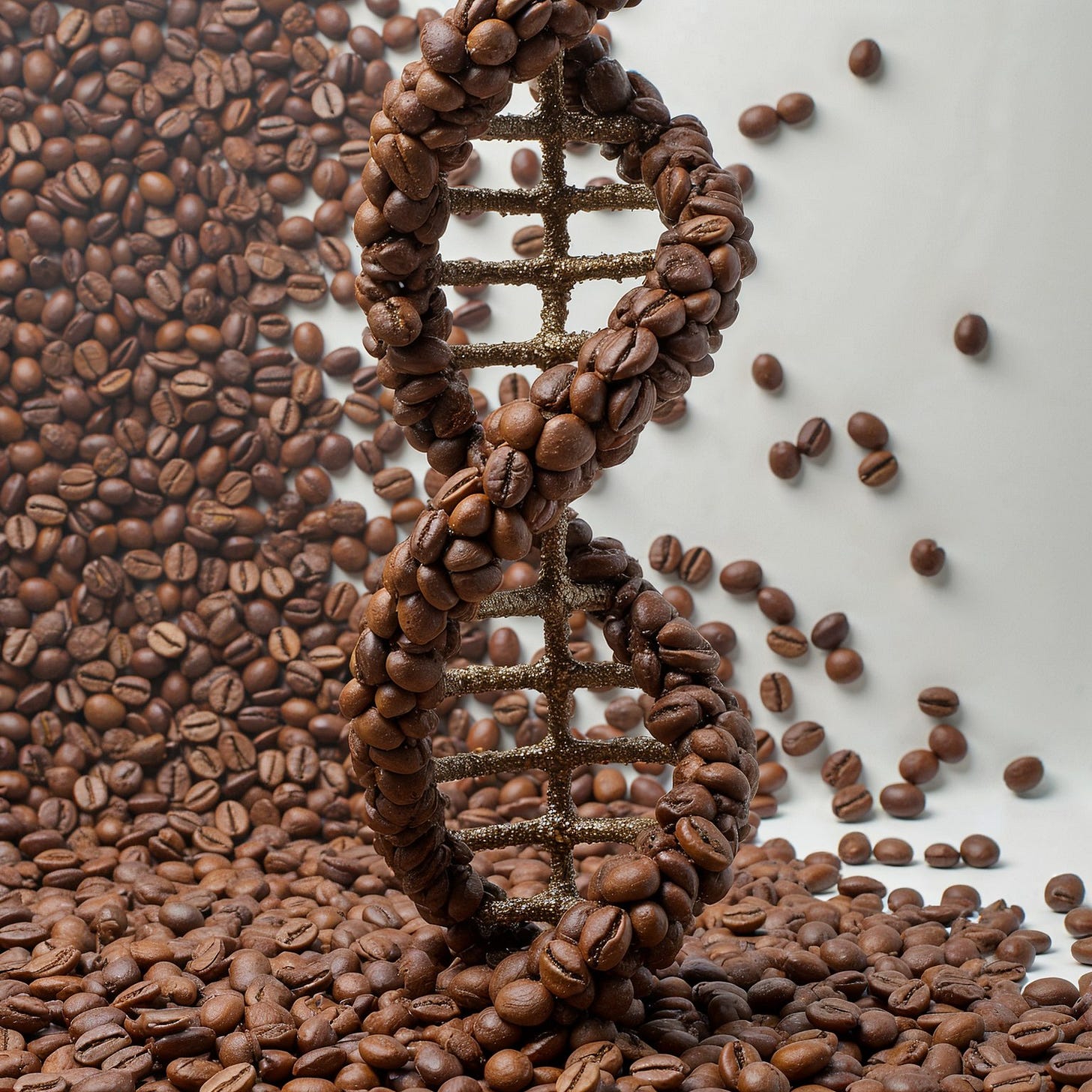The Science of Caffeine
Benefits, Risks, and the Mysteries Yet to Be Solved
By Geraldo Neto
Caffeine is a part of our daily lives, helping us stay awake, focused, and energized throughout the day.
Whether consumed as coffee (our primary source), tea, or energy drinks, caffeine is essential for billions of people around the world.
But is there more to caffeine than we already know?
Global Coffee Consumption: A Surprising Scandinavian Habit
In the 2021/2022 period, global coffee consumption reached nearly 176 million 60-kilo bags, highlighting its immense popularity. Interestingly, among the top five coffee-consuming countries, four are located in Scandinavia, and Finland leads the world in coffee consumption, with the average person consuming 12 kilograms (26.4 lbs) annually.
Caffeine Sources and Surprising Content Levels
Caffeine isn’t just about coffee. From tea to chocolate, its presence can be subtle yet impactful.
Below is a detailed breakdown:
Source
Caffeine Content (Approx.)
Coffee (8 oz cup)
80–100 mg
Espresso (1 oz shot)
63 mg
Black Tea (8 oz cup)
40–70 mg
Green Tea (8 oz cup)
20–45 mg
Energy Drinks (8 oz)
70–100 mg (varies by brand)
Cola (12 oz can)
30–50 mg
Dark Chocolate (1 oz)
12–20 mg
Milk Chocolate (1 oz)
1–5 mg
Decaffeinated Coffee (8 oz)
2–5 mg
Key Points: 1 fluid ounce (fl oz) equals about 29.573 milliliters (ml); 8 fl oz is roughly equivalent to 1 cup (about 240 ml).
The Benefits of Moderate Caffeine Consumption
Caffeine offers powerful benefits, particularly when consumed in moderation (around 200–400 mg/day for most adults).
1. Increased Alertness and Focus
Caffeine blocks adenosine receptors, keeping you awake and improving concentration. Whether you’re tackling an early-morning meeting or pushing through an afternoon slump, it can help sharpen your mind.
2. Enhanced Athletic Performance
Research shows caffeine boosts endurance and muscle performance during exercise. In fact, it’s no longer considered a performance-enhancing drug in professional sports.
3. Improved Headache Relief
Combining caffeine with over-the-counter painkillers enhances their effectiveness for tension headaches and migraines. For instance, 100 mg or more of caffeine can amplify the impact of common pain relievers.
The Risks of Overconsumption: Proceed with Caution
While caffeine is generally safe, excessive intake (over 400 mg/day) can lead to health issues.
1. Anxiety and Insomnia
Consuming too much caffeine can overstimulate the brain, resulting in restlessness, anxiety, or trouble sleeping.
2. Digestive Issues
Caffeine accelerates the digestive process, which can lead to cramping or diarrhea in sensitive individuals. It may also irritate the stomach, particularly for those with acid reflux.
3. Bone Health Concerns
High caffeine intake can inhibit calcium absorption, increasing the risk of osteoporosis over time.
Caffeine Dependency: A Growing Concern
Frequent caffeine use can lead to dependency. Your brain adapts to regular intake by creating more adenosine receptors, which makes you crave higher doses for the same effect.
Tip for Improvement: Gradually reduce caffeine intake by switching to lower-caffeine drinks like green tea or decaf coffee to reset your tolerance.
Variability in Caffeine Metabolism
Not everyone processes caffeine the same way. Genetics play a significant role, with some people metabolizing caffeine quickly while others retain it longer, leading to jitters or insomnia.
A friend of mine can drink an espresso shot at night and fall asleep effortlessly, while I find even an afternoon cup of tea can disrupt my sleep schedule.
What Are Scientists Still Studying About Caffeine?
Caffeine is a fascinating and complex substance, and despite decades of research, there’s still a lot to learn about its effects on the body and mind. Here’s a look at some of the areas scientists are diving into:
1. Caffeine and Cognitive Performance
Ongoing Questions: Scientists are exploring how caffeine affects different aspects of cognitive function, including memory, reaction time, and reasoning.
Recent Findings: Studies suggest that caffeine might improve reaction times but could also slightly impair memory and reasoning tasks, depending on timing and dosage.
2. Caffeine’s Role in Exercise Performance
Current Focus: Researchers are studying how genetics and daily habits influence caffeine’s effectiveness for improving athletic performance.
3. Caffeine and Fat Metabolism
The Big Question: Can caffeine help the body burn fat more efficiently?
Current Findings: Studies show that caffeine boosts fat oxidation during exercise, but more research is needed on how factors like sex, tolerance, and training affect these outcomes.
4. Caffeine and Heart Health
Conflicting Results: While caffeine is generally safe in moderation, its effects on the heart remain a topic of debate. Some studies link caffeine to increased blood pressure, while others show no significant long-term risks.
What’s Next: Researchers aim to pinpoint safe caffeine thresholds for different populations and study how genetic factors might play a role.
Conclusion: The Mystery of Moderation
Caffeine can be a “blessing” and a “challenge”. While it provides incredible mental and physical benefits, it’s essential to understand your unique tolerance and metabolism to enjoy it responsibly.
Pay attention to how your body responds to caffeine, and make adjustments to strike the perfect balance. Experiment with smaller doses, healthier alternatives, and caffeine-free options to stay energized without overdoing it.
References
Statista. Global coffee consumption statistics. Retrieved from https://www.statista.com/statistics/292595/global-coffee-consumption.
Hawaii Coffee Company. Most caffeinated countries: Global coffee consumption trends. Retrieved from https://hawaiicoffee.com/most-caffeinated-countries.
Timothy M. McLellan, John A. Caldwell, and Harris R. Lieberman. "A review of caffeine’s effects on cognitive, physical, and occupational performance." Neuroscience & Biobehavioral Reviews, 71 (2016): 294-312. https://doi.org/10.1016/j.neubiorev.2016.08.001.
Brian Fiani, L. Zhu, B. Musch, and S. Briceno. "The neurophysiology of caffeine as a central nervous system stimulant and the effect on cognitive function." Cureus, 13(7) (2021): e16459. https://doi.org/10.7759/cureus.16459.
Ian Clark and H. Landolt. "Coffee, caffeine, and sleep: A systematic review of epidemiological studies and randomized controlled trials." Sleep Medicine Reviews, 31 (2017): 70-78. https://doi.org/10.1016/j.smrv.2016.01.006.
Angeliki Kapellou, Alexandra King, C. Graham, L. Pilic, and Y. Mavrommatis. "Genetics of caffeine and brain-related outcomes - a systematic review of observational studies and randomized trials." Nutrition Reviews, (2023). https://doi.org/10.1093/nutrit/nuad029.
G. L. Martins, J. Guilherme, L. H. Ferreira, Tácito Pessoa de Souza-Junior, and A. Lancha. "Caffeine and exercise performance: Possible directions for definitive findings." Frontiers in Sports and Active Living, 2 (2020): 574854. https://doi.org/10.3389/fspor.2020.574854.
Jorge Gutiérrez-Hellín, J. Del Coso, M. Espada, Víctor Hernández-Beltrán, Cátia C. Ferreira, D. Varillas-Delgado, Nuria Mendoza Laiz, Justin D. Roberts, and J. Gamonales. "Research trends in the effect of caffeine intake on fat oxidation: A bibliometric and visual analysis." Nutrients, 15 (2023). https://doi.org/10.3390/nu15204320.
A. Zulli, Renee M. Smith, P. Kubatka, J. Novák, Y. Uehara, Hayley Loftus, T. Qaradakhi, M. Pohanka, N. Kobyliak, A. Zagatina, J. Klimas, A. Hayes, G. Rocca, M. Soucek, and P. Kruzliak. "Caffeine and cardiovascular diseases: critical review of current research." European Journal of Nutrition, 55 (2016): 1331-1343. https://doi.org/10.1007/s00394-016-1179-z.
Marilyn Cornelis, S. Weintraub, and M. Morris. "Recent caffeine drinking associates with cognitive function in the UK Biobank." Nutrients, 12 (2020). https://doi.org/10.3390/nu12071969.
Stephanie N. Rodda, N. Booth, and S. Merkouris. "Mechanisms for the reduction of caffeine consumption: What works?" Addictive Behaviors Reports, 11 (2020): 100-114. https://doi.org/10.1016/j.abrep.2020.100114.
B. Mills, M. Lee, and J. Roberts. "Reduction in caffeine withdrawal after open-label placebo treatment." Journal of Psychosomatic Research, 156 (2023): 110-119. https://doi.org/10.1016/j.jpsychores.2023.110119.









